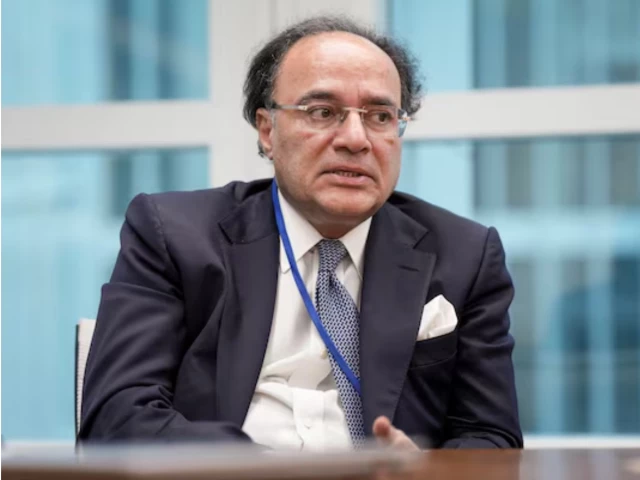Encourages banks to invest directly in Pakistan’s financial sector and trade flows
Finance Minister Muhammad Aurangzeb speaks during an interview with Reuters at the 2025 Spring Annual Meetings of the IMF and the World Bank in Washington, DC, United States, April 25, 2025. Photo: Reuters/File
Federal Minister for Finance and Revenue, Senator Muhammad Aurangzeb, concluded his visit to Washington, DC, with a series of important meetings on the last day of his participation in the annual meetings of the International Monetary Fund (IMF) and the World Bank.
The minister met the senior management of Abu Dhabi Commercial Bank (ADCB) and briefed them about the launch of Pakistan’s Panda Bond and the refresh of the Global Medium-Term Note (GMTN) programme, a press release said.
He took stock of the progress of the privatization program, expressing optimism about the accelerated privatization of the national carrier.
Aurangzeb informed the ADCB team that the Government of Pakistan was close to closing the financing for the Reko Diq project and was looking forward to the participation of Exim Bank.
He encouraged the Bank to gain direct exposure to Pakistan’s financial sector and intermediary trade and investment flows.
In a separate meeting with JP Morgan’s senior management, the Finance Minister shared details of the upcoming inaugural launch of the Green Panda Bond in the Chinese market. He also gave a comprehensive overview of the privatization programme, including the G2G sale of First Women Bank, recently approved by the Federal Cabinet.
Senator Aurangzeb highlighted the growing interest of US companies in the Reko Diq project and anticipated the early participation of Exim Bank in the syndication process.
He also discussed avenues for digital collaboration between Saudi Arabia and Pakistan through the GO AI Hub and encouraged JP Morgan to explore other areas of partnership.
The Finance Minister also met with Mehmet Simsek, Minister of Treasury and Finance of Turkey, where both sides reaffirmed the strong bilateral ties and frequent leadership-level engagements between the two countries.
Senator Aurangzeb highlighted the ongoing reforms in Pakistan in the areas of taxation, energy, public enterprises, privatization and public finance.
He discussed the event organized by the World Bank showcasing the transformation journey of the Federal Board of Revenue (FBR) of Pakistan and agreed on the importance of improving the tax-to-GDP ratio and integrating data across government agencies.
Read: IMF releases $1.2 billion after government reviews pre-flood promises
During his meeting with Makhtar Diop, Managing Director of the International Finance Corporation (IFC), Senator Aurangzeb welcomed the IFC’s decision to make Pakistan a regional hub.
He briefed the Managing Director on the progress made under the Reko Diq project and expressed hope that Exim Bank would soon join the financing consortium.
The Minister appreciated IFC’s continued support in the areas of subnational finance and digital payment rights (DPR), as well as its advisory services in the pharmaceutical, electric vehicle (EV) and commodity exchange sectors.
He also welcomed the upcoming visit of the IFC Managing Director to Pakistan during the Spring Meetings and witnessed the signing of a swap agreement between the State Bank of Pakistan (SBP) and the IFC.
Senator Aurangzeb also participated in the 15th V20 Ministerial Dialogue on “Cost of Capital, Debt and Growth Pathways”. In his speech, he highlighted the devastating impact of recurring floods in Pakistan, emphasizing the government’s commitment to funding rescue and relief operations from its own resources.
He appreciated the support of the CVF-V20 Secretariat in developing Pakistan’s Climate Prosperity Plan (CPP) and noted that funds were available through the Country Partnership Framework (CPF) to operationalize it.
The Minister called for the urgent implementation of the Loss and Damage Fund and highlighted the need for accelerated decision-making within the Green Climate Fund (GCF).
During his visit, the minister also spoke to US-based Pakistani media, where he provided a comprehensive account of his week-long discussions and engagements with international financial institutions, partner countries and private sector stakeholders.
Learn more: IMF forecasts Pakistan’s growth at 3.6%
Senator Muhammad Aurangzeb’s participation in the annual meetings of the IMF and the World Bank and his numerous engagements with global financial institutions reaffirm Pakistan’s commitment to economic reform, fiscal responsibility and international cooperation.
Agreement with the IMF
Prime Minister Shehbaz Sharif confirmed a staff-level agreement with the International Monetary Fund for a disbursement of $1.2 billion and expressed hope that it would be the last such program for Pakistan.
Chairing a cabinet meeting on Thursday, he said the time had come “to free ourselves from the burden of debt”. Hard work is the first condition of national independence and dignity,” Shehbaz said, adding that Pakistan’s economic stability would strengthen its voice and respect in the world.
The IMF on Wednesday announced the agreement to release the next loan tranches of $1.2 billion after Islamabad, for now, accepted the old pre-flood fiscal targets and released the governance report ahead of the board meeting.
After board approval, Pakistan will have access to about $1 billion under the EFF and another $200 million under the RSF, Iva Petrova said. In total, the IMF will disburse $3.1 billion under the EFF out of the $7 billion planned.
Also read: PM hopes IMF will conclude final loan deal with Pakistan
The IMF on Tuesday forecast Pakistan’s economic growth rate of 3.6 percent for the current fiscal year, with Finance Minister Muhammad Aurangzeb expressing hope that a staff-level agreement for Pakistan for two tranches worth $1.2 billion would be reached this week.
The IMF released the Washington World Economic Outlook report, projecting Pakistan’s economic growth rate at 3.6 percent. But it specifies that Pakistan’s economic projections “do not yet reflect the impact of floods in summer 2025, the impact of which is still being assessed.”




